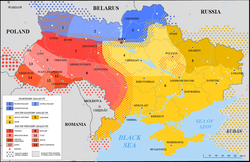| West Polesian | |
|---|---|
| захыднёполіськая мова | |
| Native to | Belarus, Ukraine, Poland |
| Region | Southwestern Belarus, northwestern Ukraine, bordering regions of Poland |
Indo-European
| |
Early forms | |
| Dialects | |
| Cyrillic | |
| Language codes | |
| ISO 639-3 | – |
| Glottolog | west2977 |


West Polesian (захыднёполіськая мова, zakhydnyopolis'kaya mova[citation needed]) is the East Slavic dialect group (or variety) spoken in southwestern Belarus, in northwestern Ukraine and adjoining regions of Poland. There is controversy regarding whether West Polesian belongs to Belarusian or Ukrainian, or is a separate microlanguage (as has been proposed by linguist Aleksandr Dulichenko).
Various variants or dialects of West Polesian are used in everyday speech. Attempts were made in the 1990s by Nikolai Shelyagovich to develop a standard written language,[1] although his efforts received almost no support and the campaign eventually ceased.[2] In particular, writer Nil Hilevich and some others spoke against Shelyagovich, claiming that he represented a threat to the national integrity of Belarus, and labelled "Yotvingian separatism".[3]
- ^ Цыхун Г.А. Пра заходнепалескую літаратурную мікрамову (праект М. Шэляговіча) (retrieved July 13, 2016) First published in: Матэрыялы навукова-краязнаўчай канфэрэнцыі "Палесьсе ў ХХ ст." (1-4 чэрвеня, Беласток) / Укл. і аг. рэд. Ф.Клімука, А.Энгелькінг, В.Лабачэўская. — Менск: Тэхналёгія, 2001. — 320 с. — Наклад 320 ас. ISBN 985-458-034-2
- ^ Цадко О. Полесье и опыт национального конструирования (1988–1995), Палітычная сфера. Гісторыя і нацыя, no.24 (1), 2016, pp. 78-93.
- ^ Дынько А. Найноўшая гісторыя яцвягаў, ARCHE, no. 6 (11), 2000. Quote: "Аформілася і супрацьлежная партыя. Лідэры Таварыства Беларускай Мовы Ніл Гілевіч, Яўген Цумараў і Алег Трусаў (вось дзе гняздо беларускага фундаменталізму) узначалілі фронт змагання супраць «яцвяжскага сепаратызму» на старонках «ЛіМу», «Нашага Слова» і ў Вярхоўным Савеце, і «Збудінне» кляйміла іх выступы як «провокашыны лытвынських шовыныстив». Паэт Мікола Федзюкевіч усхвалявана выкрываў, што ягоныя дарагічынскія дзядзькі яцвяжскай мовы не разумеюць і што "асаблівую насцярожанасць выклікалі ў палескіх хлебаробаў наступныя радкі."